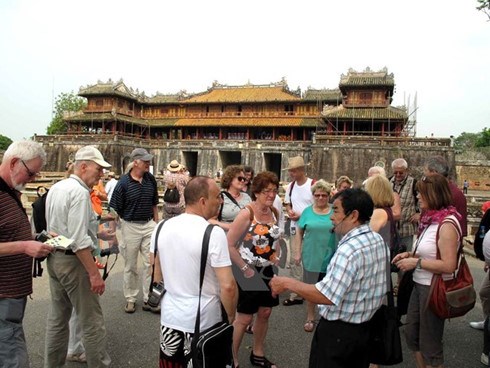Thua Thien-Hue issues code of conduct for tourists
 |
| Foreign tourists in Hue |
The guidebook includes illustrations of dos and don’ts. It encourages tourists to respect local traditions, behave in a civilized manner, protect historical relics, support the disabled, elderly, pregnant women and children, and to queue up when using public services or joining activities at public places.
Thua Thien –Hue houses Hue city, which was the imperial capital of Vietnam for hundreds of years. Hue is home to five heritages recognised by UNESCO, namely the Hue ancient citadel relic complex – a World Cultural Heritage site; Nha Nhac (Hue royal court music) – an intangible cultural heritage item; Nguyen Dynasty’s wood blocks – a documentary heritage item; Nguyen Dynasty’s Chau ban (royal administrative documents) – part of the Asia-Pacific Register of UNESCO’s Memory of the World Programme; and literature on Hue royal architecture - a documentary heritage.
In 2017, the total number of tourists to Hue rose 16 percent to 3.8 million, contributing to the local tourism revenue of over 320 billion VND (14 million USD).
In 2018, the provincial tourism sector hopes to welcome between 4-4.2 million visitors, of which foreigners make up of 40-45 percent, up 10 percent and 12 percent from 2017, respectively, generating 4-4.2 trillion VND (176 million-184.8 million USD).
What the stars mean:
★ Poor ★ ★ Promising ★★★ Good ★★★★ Very good ★★★★★ Exceptional
Latest News
More News
- Manila becomes a new check-in destination for Vietnamese youth (December 11, 2025 | 18:07)
- Vietjet launches mega year-end ticket promotion (December 10, 2025 | 11:33)
- Dalat leads Vietnam’s 2025 search trends (December 09, 2025 | 13:44)
- Vietnam welcomes record wave of international visitors (December 09, 2025 | 13:43)
- Vietjet launches daily Manila flights to celebrate year-end festive peak season (December 05, 2025 | 13:47)
- The destinations powering Vietnam’s festive season travel demand (December 04, 2025 | 18:33)
- Vietnam named among the world’s most exciting winter destinations (December 04, 2025 | 15:10)
- Phu Tho emerges as northern Vietnam’s new tourism hub (December 01, 2025 | 17:00)
- Vietjet completes Airbus A320/A321 updates ahead of deadline (December 01, 2025 | 09:49)
- Vietjet resumes Con Dao flights from early December (November 28, 2025 | 15:24)
















 Mobile Version
Mobile Version